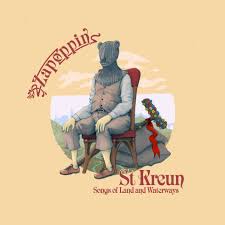Folk-punk isn’t a term I want to throw around lightly. I’m well aware that it conjures up images of twee, middle-class bores bashing out Sex Pistols songs on ukuleles, or overweight Americans romanticising their tenuous Irish heritage via lowest common denominator, beery bro-stomps. And yet folk is fine; punk is fine; and if the phrase ‘folk-punk’ seems the best shorthand for Zapoppin’s music, then it’s despite the fact that they have absolutely nothing in common with any of the above stereotypes.
For one thing, Zapoppin’s brand of punk is of the more experimental, free range variety practised by Pere Ubu, Minutemen, Mekons or Yeah Yeah Noh. And their ‘folk’ incorporates field recordings, electronic drones and, most prominently, an overdriven harmonium. Their press release cites the "rural exploration" records of Woody Guthrie and Shirley Collins as reference points, but admits that St Kreun sounds nothing like them.
The rural exploration theme comes from the fact that the album is supposedly a document of a journey the Plymouth band made to the forgotten Cornish parish of St Kreun in the summer of 2015. Embarking as a trio, they returned as a duo. After several listens to the record, I’m none the wiser as to what happened; if St Kreun is a travelogue, it’s one directed by David Lynch at his most oblique.
It opens with a brief banjo jig – ‘Belnot Phist’s Hanging’ – before the sounds of a churning waterwheel usher in the stomping ”Dam’. As the pumping harmonium competes with a relentless marching beat, unhinged guitar and distorted vocals, we find ourselves on a faultline between rural Cornwall and early eighties Berlin, where the atmosphere of Witchfinder General infects the deranged cabaret-noir of The Birthday Party or Crime & The City Solution. And if ‘Hate So Hard’ is more straightforwardly aggressive, then the loping ‘Playin’ The Fool,’ recalls very early Pulp or Band of Holy Joy as well as the sometime work of Nick Cave or Rowland S Howard. Luke Richards’ spooked, lugubrious delivery wraps itself around some unlikely convoluted lyrics before breaking into screams of frustration as a drunken midnight choir sways behind him.
A disaffected Casio drum machine pops and sighs behind ‘Conveyor Belt Of Love,’ a rough-hewn recreation of the romantic ballad form for an artificial age. The half-starved guitar- which elsewhere darns and dances in spindly spider-riffs of no fixed destination- makes a heartfelt stab at imitating a troubadour’s mandolin, while Luke croons gamely about quality control and assessment facilities. ”Duct’ parallels side one’s ”Dam’; the sound of a giant Morris dancer pounding the floor of a vast empty cavern is the only accompaniment to a dolorous recital that is a confession of sorts. "I got no sense of meter, mister," is hardly the worst of it. And if ‘Stuckist’s Luck’ shares a taste for deliberate primitivism with the artistic comrades of Billy Childish referenced in the title, then ‘Hey Girl, Let’s Meme’ captures the true spirit of young romance in 21st century Britain, with its uncontrolled energy rushes, sudden slumps and declarations not of love but at least of "swellings" and "wellings."
Ultimately uncategorisable, by the time of the closing ‘Poignant Mo-Fo’ Zapoppin’ seem like the lost John Peel band that never was, touching on all key points of the late great DJ’s legendarily eclectic musical multiverse. The final track could be The Wedding Present jamming with Ivor Cutler, or Half-Man Half-Biscuit whipped into shape by Captain Beefheart; proving that this imaginary journey is musical as much as it is geographical.


